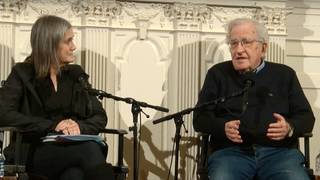
Last week, the Trump administration reportedly prepared an arrest warrant for WikiLeaks founder Julian Assange, and Attorney General Jeff Sessions said the Justice Department was seeking to put Assange in jail. Amy Goodman asked world-renowned linguist and dissident Noam Chomsky about the U.S. targeting of Julian Assange, during a wide-ranging conversation at the First Parish Church in Cambridge, Massachusetts, on Monday night.
Transcript
AMY GOODMAN: Noam, I wanted to, before we get to your book, your latest book, ask you about this latest development in the United States. The director of the Central Intelligence Agency gave his first major address, and he focused on WikiLeaks. And it looks like now the U.S. is preparing an arrest warrant for Julian Assange, who’s been holed up in the Ecuadorean Embassy in London for almost five years now. Pompeo calling WikiLeaks a “hostile non-state intelligence service,” calling Julian Assange himself a “demon,” and said he’s not protected by the First Amendment. Your thoughts?
NOAM CHOMSKY: Well, I think it speaks for itself. WikiLeaks has released lots of information that governments don’t like. It’s overwhelmingly information that citizens should have. It’s information about what their governments are doing. And perfectly natural that systems of power don’t want to be exposed, so they’ll do what they can to prevent exposure. I think it’s a disgraceful act. In fact, I think it’s disgraceful even to keep Julian Assange holed up in the Ecuadorean Embassy. I did visit him there once, but you can guess yourself. It’s, in many ways, worse than imprisonment. At least if you’re in prison, you can see other prisoners, and you can get out and look at the sunshine now and then. He’s in a small apartment, where he can’t go out. You know, he can go to the balcony, but that’s about it, a small—basically, a couple of rooms inside a small apartment. It’s not a big embassy. The embassy is like a kind of an apartment in London, surrounded by police and so on. There’s been no credible basis for any of this. And to go on to try to raise it to the level of criminal prosecutions, I think, is, again, one of these efforts to look tough at home, and the kind of effort that a government would carry out that is dedicated to trying to protect itself from exposure of facts that citizens should have, but systems of power don’t want them to have. I think that’s the crucial issue.
AMY GOODMAN: The suggestions are it has to do with his aiding and abetting perhaps Chelsea Manning and also Edward Snowden, doing that with Edward Snowden, which he openly admits, while he’s trapped in the Ecuadorean Embassy.
NOAM CHOMSKY: If the charge is true, he should be honored for it. Chelsea Manning and Edward Snowden carried out heroic, courageous acts. They fulfilled the responsibility of somebody who takes citizenship seriously—that is, who believes that the people of a country ought to know something about what their government is up to. OK? Like if their government is carrying out murderous, brutal attacks in Iraq, people should know about it. Takes us back to Martin Luther King’s talk in 1967. If the government is, and corporations, too, incidentally, are listening in to your telephone conversations and what you’re doing, you know, tapping this discussion and so on, we should know about it. Governments have no right to do things like that. And people should know about it. And if they think it’s OK, fine, let them decide, not do it in secret. And I think people wouldn’t agree to it. That’s why it’s kept secret. Why else keep it secret? You know? And these are people who exposed it at great risk to themselves. So those are heroic, courageous acts. If WikiLeaks was abetting them, more power to them. That’s what they should be doing.
AMY GOODMAN: I mean, President Trump endorsed WikiLeaks, right? He said, “I love WikiLeaks,” during the campaign.
NOAM CHOMSKY: Yeah, when it was releasing things that he liked, yeah. Any system of power will do that. “You release information that I like, it’s great. But I don’t want to be exposed.”
AMY GOODMAN: That’s MIT professor Noam Chomsky speaking on Monday at the First Parish Church in Cambridge. To see our full conversation, go to democracynow.org.
That does it for our show. I’ll be speaking at Middlebury College in Vermont today at noon, then on to the Vermont College of Fine Arts in Montpelier at 7:00. Tomorrow, Thursday, at noon, I’ll be at Bennington College, tomorrow night at the Unitarian church on Pearl Street in Burlington, Vermont. Then, on Saturday night, after Democracy Now!'s 5-hour broadcast of the People's Climate March in Washington, D.C., I’ll be speaking at the Plymouth Congregational Church.












Media Options